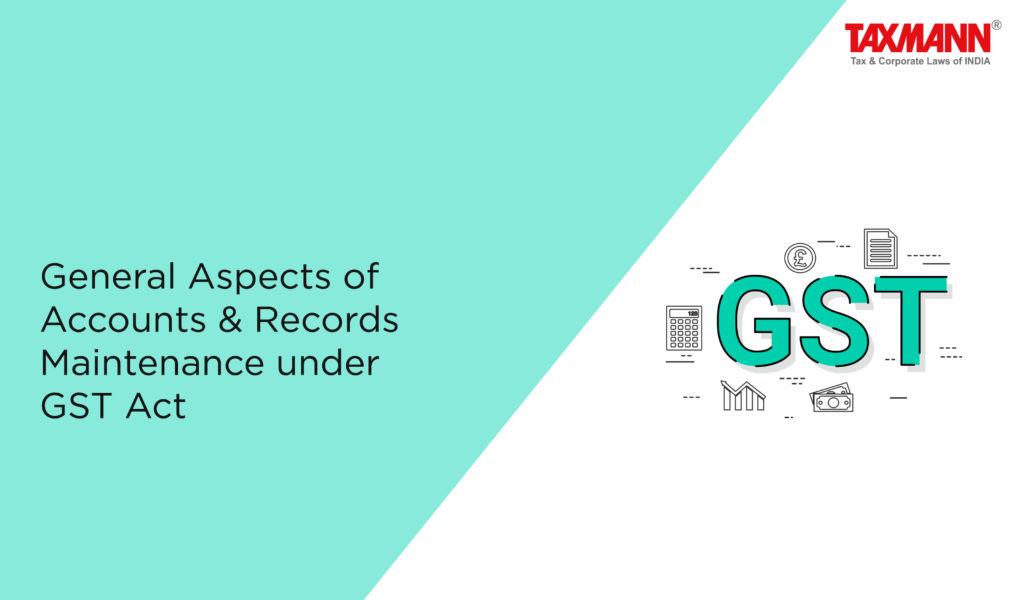General Aspects of Accounts & Records Maintenance under GST Act
- Blog|GST & Customs|
- 2 Min Read
- By Taxmann
- |
- Last Updated on 17 July, 2023

Check out Taxmann's GST Practical Guides | Accounts & Records Maintenance under GST Act which provides insights into accounts & records maintenance under GST Act, covering practical requirements, document maintenance, and accounts management. This book will be helpful for tax practitioners and legal professionals. It is amended by the Finance Act 2023 and is developed by the Goods & Services Tax Practitioners' Association of Maharashtra.
The provisions related to accounts & records are mandated under section 35 and section 36 of the CGST Act, 2017. Nonetheless, there can be areas where book-keeping may have to travel beyond the contents mandated under the aforesaid provisions for better compliances. Hence, some additional areas which can also be included towards record maintenance which are recommendatory in nature could be the following:
- Accounting plays an abetting role for the registered person in clarifying issues raised by the tax authorities at a later stage. Hence adequate care shall be taken by the registered person while accounting, especially, for litigated matters, high value transactions, complex agreements etc.
- Principles followed under the GST law and as prescribed under the Accounting Standards may not be on similar lines. Therefore, adequate reconciliations and such other explanatory statements can be maintained explaining differences, if any.
- Details of the Harmonised System of Nomenclature (HSN) in case of goods and Service Accounting Codes (SAC) in case of services shall be recorded for the transactions at all possible levels of book keeping.
- Special attention to be given towards recording of the place of supply, registration details of the vendors/suppliers and customers/recipients.
- Adequate records for additional procedures prescribed for supplies involving ISD, SEZ, EOU etc., to be maintained.
- Recording of the inward supplies shall be done as inputs, input services and capital goods. Further, identification of attributability of the inward supplies with the respective outward supplies i.e., taxable, non-taxable, exempted, NIL rated, zero rated etc., shall also be recorded.
- Units of measurements for the quantitative details, wherever required shall be carefully recorded, especially, for manufacturing activities.
- Comprehensive registers for e-way bills, credit notes, debit notes also be maintained.
- Adequate documents to be maintained for cross border transactions involving foreign exchange.
- Proper documentary evidence to be preserved for transactions involving non-monetary consideration, free supplies, gifts, goods lost, stolen, destroyed or written off.
- Worksheets for the valuation issues, input tax credit reversals, reverse charge, interest calculations, refund calculations, annual reconciliations etc., be prepared.
For industries like construction sector, the project-wise and apartment wise databases also be maintained.
Disclaimer: The content/information published on the website is only for general information of the user and shall not be construed as legal advice. While the Taxmann has exercised reasonable efforts to ensure the veracity of information/content published, Taxmann shall be under no liability in any manner whatsoever for incorrect information, if any.

Taxmann Publications has a dedicated in-house Research & Editorial Team. This team consists of a team of Chartered Accountants, Company Secretaries, and Lawyers. This team works under the guidance and supervision of editor-in-chief Mr Rakesh Bhargava.
The Research and Editorial Team is responsible for developing reliable and accurate content for the readers. The team follows the six-sigma approach to achieve the benchmark of zero error in its publications and research platforms. The team ensures that the following publication guidelines are thoroughly followed while developing the content:
- The statutory material is obtained only from the authorized and reliable sources
- All the latest developments in the judicial and legislative fields are covered
- Prepare the analytical write-ups on current, controversial, and important issues to help the readers to understand the concept and its implications
- Every content published by Taxmann is complete, accurate and lucid
- All evidence-based statements are supported with proper reference to Section, Circular No., Notification No. or citations
- The golden rules of grammar, style and consistency are thoroughly followed
- Font and size that’s easy to read and remain consistent across all imprint and digital publications are applied




 CA | CS | CMA
CA | CS | CMA
